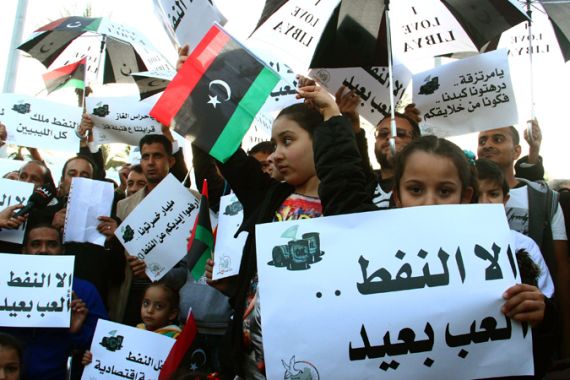Seized Libyan oil ports ‘will not reopen’
Group seeking autonomy for eastern Libya refuses to surrender three oil-exporting ports, costing government billions.

The leader of an autonomous movement in eastern Libya has refused to end the blockade of several oil-exporting ports, dashing hopes of ending a months-long standoff with the central government in Tripoli.
Ibrahim Jodhrane, head of the security guards at the ports, said on Sunday that his group’s demands for more autonomy in the country’s east and a cut of oil shares had not been met. The group is also asking for an investigation into claims of government corruption over oil sales.
“We have failed to reach a deal on these conditions with this [Tripoli] government,” Jathran told reporters at his group’s home base in Ajdabiya in the eastern part of the country.
“I therefore confirm that we will not reopen the ports for this corrupt government,” he said.
There was no immediate comment from Tripoli.
Leaders from the powerful al-Magharba tribe seized the three oil ports – Zueitina, Ras Lanouf and Al-Sedra – in July. The ports previously accounted for oil exports of 600,000 barrels per day (bpd).
Abdelbari al-Arusi, Libya’s oil minister, has said the lost oil production had cost the country “around $9bn” in revenue.
On Saturday, Abd-Rabbo al-Barassi, prime minister of the group’s self-declared eastern government, told Reuters news agency: “If they agree on our demands, then the ports will reopen on Sunday. If they don’t agree, then we’ll insist on selling the oil without government coordination.”
Government struggling
Government officials have refused to recognise the self-declared government and warned that Tripoli will attack any tanker trying to load oil at the seized ports.
Libya remains in turmoil as the government struggles to rein in the militias that helped topple and kill former leader Muammar Gaddafi in 2011, and now control parts of the North African country.
The autonomous regional government was set up in eastern Libya in early November, challenging the country’s weak central government.
A mix of militias, tribesmen and officials have seized oilfields and export terminals across the country, bringing exports down to 110,000 bdp from more than one million in July.
Workers at several other oilfields in Libya are also on strike, drying up the majority of Libya’s oil exports, the country’s main source of revenue.
Libya needs dollars to fund imports of wheat and other basic foodstuffs. The central government has warned it will not be able to pay public sector workers if oil strikes continue.